|
|
|
Sort Order |
|
|
|
Items / Page
|
|
|
|
|
|
|
| Srl | Item |
| 1 |
ID:
153343
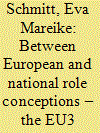

|
|
|
|
|
| Summary/Abstract |
This paper addresses whether Germany, France and the UK (the EU3) – with the EU in the background – can shape their own approach to a common Europeanised position or even a European role conception regarding the Iranian Nuclear Programme. As the EU3 initiative appears situated between Europeanisation and national role conceptions, it seems that the EU3 members – after a coherent start – were finally inclined to readapt themselves to certain of their national role conceptions, resulting in a “mix” of national and European role patterns in the process leading up to 2016. Currently, this mix hints at still-prevailing hindrances involved in genuine European conflict management, although this outcome holds the promise of greater European coherence in the future.
|
|
|
|
|
|
|
|
|
|
|
|
|
|
|
|
| 2 |
ID:
153344


|
|
|
|
|
| Summary/Abstract |
Focusing on natural gas and pipeline infrastructures, and adopting the concept of “forms of state”, the article examines the transformation of energy security politics in Europe. Three state models, with their related pattern of energy diplomacy, are sketched: the partner state, which describes the original politics of the European gas market; and the provider state and catalytic state, which describe two alternative possibilities of the emerging politics in the new institutional and ideational context promoted with the establishment of the internal energy market and the development of the EU’s external energy policy. By analysing the politics of pipeline in Southeastern Europe, the article argues that the catalytic state model with its related pattern of network energy diplomacy is more appropriate than the provider state model, supported by the market approach and its related pattern of multilateral diplomacy, to conceptualise the equilibrium emerging from the transformation of the previous system.
|
|
|
|
|
|
|
|
|
|
|
|
|
|
|
|
| 3 |
ID:
153337
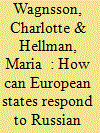

|
|
|
|
|
| Summary/Abstract |
How can European democratic states respond to Russian information warfare? This article aims to enable and spur systematic research of how democracies can respond to the spread of distorted information as part of information warfare. The article proposes four ideal-type models representing different strategies that democratic governments can employ; blocking, confronting, naturalising and ignoring. Each strategy is illustrated by ways of empirical examples of strategies applied by European states in view of what is regarded as an unwelcome Russian strategic narrative that is spread as part of information warfare. We problematise each strategy and explore reasons for why states choose one strategy over another. We then explore how different strategies might contribute to destabilise or stabilise the security environment and how they resonate with democratic values. Finally, we contribute to theorising on strategic narratives by highlighting that the choice of strategy will influence states in their formation of strategic narratives. We thus further theorising on strategic narratives by highlighting the link between strategies and narratives, thus identifying one central dynamic in how narratives are formed.
|
|
|
|
|
|
|
|
|
|
|
|
|
|
|
|
| 4 |
ID:
153342
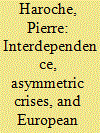

|
|
|
|
|
| Summary/Abstract |
Although international crises are often believed to represent windows of opportunity to strengthen European defence cooperation, recent crises have not seemed to produce a clear convergence of European Union (EU) member states’ security interests. This article seeks to address this puzzle by arguing that European defence cooperation is a response to crises that place European states in a situation of military interdependence. Conversely, asymmetric crises, i.e. crises that affect European states unevenly, encourage those states to maintain their autonomy of action. This theoretical argument is supported by two case studies: the failure of the European Defence Community in the early 1950s and the current difficulties experienced by the EU’s military operations. These two cases illustrate a striking continuity in that, because of (neo)colonial ties in particular, European states are often unevenly affected by international crises, which tends to make defence cooperation less effective.
|
|
|
|
|
|
|
|
|
|
|
|
|
|
|
|
| 5 |
ID:
153339
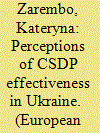

|
|
|
|
|
| Summary/Abstract |
This article makes a contribution to the little explored issue of evaluating the effectiveness of the EU Common Security and Defence Policy (CSDP). Drawing on the interviews with local beneficiaries of two missions in Ukraine, one CSDP proper (European Union Advisory Mission) and the other a “hybrid” mission (EU Border Assistance Mission), the article analyses which factors shape the local beneficiaries’ perception of a mission being effective or non-effective. It shows the reputational approach deriving from the organisational theory can offer a fruitful theoretical framework for understanding CSDP perceived effectiveness on the ground. The article contributes to the studies of CSDP and its engagement with the host state as well as to the nascent academic and policy literature on CSDP and Ukraine.
|
|
|
|
|
|
|
|
|
|
|
|
|
|
|
|
| 6 |
ID:
153338


|
|
|
|
|
| Summary/Abstract |
This paper examines the nature of Moscow’s military strategies in the Arctic. It is argued that the roles of military power have radically changed since the Cold War era. According to Russian strategic thinking, instead of being a coercive instrument in a global confrontation between two superpowers and capitalist and socialist systems, now military power has new functions, such as to ascertain Russia's sovereignty over its (not their) exclusive economic zone and continental shelf in the region, protect Moscow’s economic interests in the North, prevent illegal migration and potential terrorist attacks against critical industrial and infrastructural objects, fulfil some dual-use functions (such as search and rescue operations, monitoring air and maritime spaces, providing navigation safety, mitigating natural and man-made catastrophes), help academic community in developing Arctic research, and carry some symbolic functions. These new roles, however, do not preclude military power from fulfilling its traditional functions, such as territorial defence, power projection, deterrence, and containment. Russia’s military modernisation programmes are described. The authors arrive at a conclusion that these programmes do not provoke an arms race or undermine the regional cooperation. To prevent negative security trends, a system of arms control and confidence- and security-building measures should be developed in the region.
|
|
|
|
|
|
|
|
|
|
|
|
|
|
|
|
| 7 |
ID:
153341
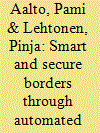

|
|
|
|
|
| Summary/Abstract |
The European Commission launched the “Smart Borders” policy process in 2011 to enhance border security in the European Union (EU) using technologisation and harmonisation. This includes the use of automated border control (ABC) systems. The Member States crucially shape the process, weighing security technologies and costs, privacy and rights, and further institutional choices. We examine the views of political stakeholders in four Member States by conducting a systematic empirical and comparative study unprecedented in the existing, political-theory-inspired research. In our Q methodological experiments, political stakeholders in Finland, Romania, Spain and the UK rank-ordered a sample of statements on Smart Borders, ABC and harmonisation. The factor analysis of the results yielded three main views: the first criticising ABC as a security technology, the second welcoming the security gains of automation and the third opposing harmonised border control. While impeding harmonisation, the results offer a consensus facilitating common policy.
|
|
|
|
|
|
|
|
|
|
|
|
|
|
|
|
|
|
|
|
|